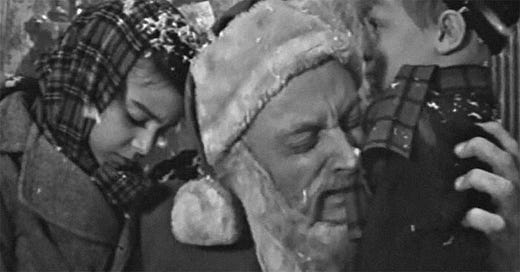Christmas in The Twilight Zone: Night of the Meek
It’s time for another entry for
With Christmas approaching next week, I wanted to highlight Rod Serling’s contribution to Christmas storytelling. I am, of course, referring to the very excellent episode: Night of the Meek.Henry Corwin is a man who has become disillusioned with the inequities of modern life. He has a unique vantage point on life. He sees both the deprivations of extreme poverty and the privilege enjoyed by the wealthy. Perhaps his ability to walk that middle line between the two extremes is because of his job as a department store Santa. The only thing we can know for certain is that his exposure to human suffering has created a deep-seated desire within him to make the world a better place.
We see that desire over and over again throughout this episode. It’s the source of his alcoholism and his interactions with others. It’s the catalyst for the moving moment when two children stop to ask him for gifts and a young girl asks “…for a job for her daddy.” His desire to effect change is his North Star; the guiding force for everything he does.
Ultimately, he is afforded the opportunity to act on those desires. He finds a bag that is able to magically generate gifts. He uses this new found power to fill the lives of others with happiness. It is his small effort to make the world a better place.
Rod Serling’s Worldview
I wouldn’t argue with people who say I’m wrong, but based off of the many interviews and biographies that I have read about Rod Serling, I believe this episode, that he wrote, may be his clearest presentation of everything he was trying to do as a writer. It’s a reflection of his hopes and dreams for humanity and how we would approach one another.
Serling used his writing to point out unfairness, irrational fears, and societal dangers that were shaping the world at that time. Shows like the Twilight Zone were created for a paycheck, sure. However, as he grew into the role I believe he sought to do more than just entertain. I believe that these episodes, his movies, and later his lectures were an attempt to change society and to cajole us into embracing a kinder and more thoughtful culture.
If Serling had an agenda behind his writing— and he has made statements where he plainly admits that he did— it is most clearly seen in this episode. The worldview and philosophy here allowed him to comment on a variety of situations and policies, but he was always consistent in his emphasis that all humanity was worthy of receiving basic human kindness and that there was a dignity to life. We see it time and time again in everything from The Monsters are Due on Maple Street to the script he wrote for the original Planet of the Apes movie.
Horror is about People
What does this feel-good episode of Christmas treacle have to do with horror? This particular episode doesn’t show the dark side of humanity that is so often expressed in the horror genre, but it does serve as a marvelous showcase for the most important aspect of a good horror story: character.
Recently,
has been having a sporadic conversation on Notes around the premise that horror isn’t really about the monsters; it’s about the people.He’s right. Point to any successful horror story or franchise and you will see this concept expressed. The more competently it is done the better the story. Every Stephen King story does this. He introduces characters, makes you like or identify with them in some way, and then chronicles the obstacles and nightmares that they face. Sometimes they overcome those challenges and other times they are not as successful, but we, as the readers, have connected with them and keep turning the pages because we want to read their story. In short, you don’t have Michael Meyers without Laurie Strode.
Horror’s most popular trope is known as The Final Girl. What is that trope, but an observation that every successful horror story is centered around a character who somehow manages to survive the terrifying events of the story and overcome the bad guys to live one more day? It’s always about connecting with a character and there’s no better place to do that than in The Twilight Zone.
Talk to Me
I’d like to hear from you. Do you have a favorite character from a horror story? Or from an episode of the Twilight Zone? The thing I’d like to know is why you identify with that character? What traits and qualities connect with you? How were they presented? Why do you like them?






Serling understood what his mission was more than most of the people making television at the time and he largely wrote and acted based on that.
I love this. Horror is two parts humanity, one part irrational fear, and one part rational fear. It's the golden ratio of mixed drinks, but it fits here as well. I think TZ resonates because it strikes the perfect balance. I may continue to ponder the equation as I dip my toes in the genre.